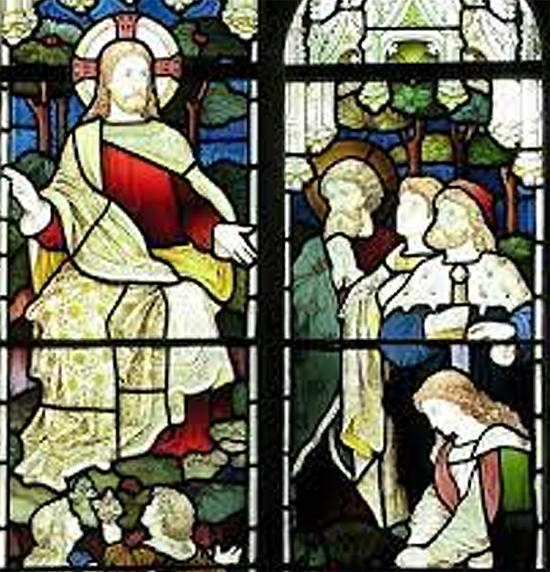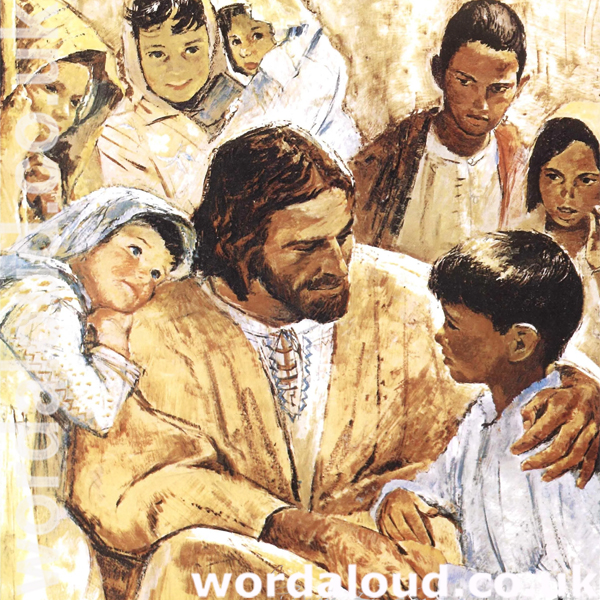Christian Art | Pearls Before Swine
Matthew 7: 6, 12-14 – Week 12 Ordinary Time, Tuesday (King James Audio Bible KJV, Spoken Word)
6 ¶ Give not that which is holy unto the dogs, neither cast ye your pearls before swine, lest they trample them under their feet, and turn again and rend you.
12 Therefore all things whatsoever ye would that men should do to you, do ye even so to them: for this is the law and the prophets.
13 ¶ Enter ye in at the strait gate: for wide is the gate, and broad is the way, that leadeth to destruction, and many there be which go in thereat:
14 Because strait is the gate, and narrow is the way, which leadeth unto life, and few there be that find it.
Give not that which is holy unto the dogs, neither cast ye your pearls before swine. This is difficult text. The dogs, the pigs – these would be terms to describe the non-Jewish, yet in acknowledging this we are aware of Jesus’ ministering to everybody, gathering crowds of disparate people, and enjoining them to coexist peacefully, while he walked in the land of the Gentiles.
It may be strange additionally that Jesus seems to be telling us to keep back from the world some part of our Christian faith, in case that which is precious should be scorned, trampled upon, and, further to this, our act of giving become a weapon against us in an enemy’s hands, our defences having been lowered. Perhaps we may wonder: is this a teaching against martyrdom? And: is our expression of Christian faith not always good?
Why is Jesus telling us to be careful, to be worldly wise, and to hoard our treasures of faith, not always giving and displaying our treasures openly?
We can begin to answer such questions by considering today’s Gospel reading as a whole. Give not that which is holy unto the dogs, and do to others as you would have them do to you. We can think of these as two aspects of the same lesson.
Faith can seem very strange and quite forbidding from the outside. Joy, the knowledge of God, is not something automatically communicated. When a person is filled with the Spirit and feels compelled to tell others about his or her sense of being newly alive, it is entirely possible that those others, who do not know God, who are atheists, will think that person is crazy. We may remember that Jesus’ mother Mary and his family sought to have Jesus put away – we would now call this sectioned – as the Bible tells us.
Faith, then, is clearly not always being communicated by those who hope to be doing so. The message is being lost. Indeed, a contrary message, not intentionally sent, might be being received, this being that Christians are wrong. It would seem a different approach might be necessary. Assuming we actually do want to communicate Christian joy, it would seem a little thought is required as to how we do this.
Give not that which is holy unto the dogs, neither cast ye your pearls before swine. And now we bring in the rest of the message, which is most explicitly about taking care of other people, and is about the fact that this is not always easy. If I have a truth that I wish to share with you, then I have to take care of you, to show respect to you, to help you to know that the message is about you – in the case of Christian truth, it is about all people equally, and it so happens that this is a message about care, respect, and love. I have to speak your language.
Christianity is all about love. God is love. In these Bible verses, Jesus teaches us that love is not easy. It requires quite a lot of restraint, this because love is not about inflicting ourselves on those we love; rather we withhold our own needs, including our emotional needs, in order to serve the beloved better. We restrain ourselves so as to magnify the other, our loved ones.
Give not that which is holy unto the dogs. By maintaining our sense of what is sacred, and by being alert to just how precious this is, we become more able to share our joy, our relationship with God, our love with God, and for this to be communicated. God helps us in this way to bring other people to faith, rather than putting them off faith and driving them further away.
God wants us to attract other people to Christianity because it is what’s right – because living with God is our natural way of living – and to do so by taking immense care of our gifts. If we live well, and as we give our lives to Jesus, then we can be sure that others, who perhaps do not yet know God, will come to us. This is a delicate evangelization.
Ho, every one that thirsteth, come ye to the waters, and he that hath no money; come ye, buy, and eat; yea, come, buy wine and milk without money and without price. (Isaiah 55: 1)
Concluding Prayer
As we pray before you, Lord,
we ask you, in your mercy, for the grace
always to ponder in our hearts
what we proclaim with our lips.
We make our prayer through our Lord.

![]()
King James Audio Bible | Endnotes
Give Not That Which Is Holy Unto The Dogs
The verse Matthew 7:6 , ‘Give not that which is holy unto the dogs, neither cast ye your pearls before swine, lest they trample them under their feet, and turn again and rend you,’ has been a source of contemplation for Christians. Its meaning is both profound and complex.
In Matthew 7:12-14, Jesus teaches the Golden Rule, saying: ‘Therefore all things whatsoever ye would that men should do to you, do ye even so to them: for this is the law and the prophets.’ Jesus then goes on to warn his listeners that the path to eternal life is narrow and difficult, saying: ‘Enter ye in at the strait gate: for wide is the gate, and broad is the way, that leadeth to destruction, and many there be which go in thereat.’
Taken together, these Gospel verses paint a picture of a world in which the pursuit of holiness and righteousness is a difficult and narrow path, and in which there are those who would seek to distract and undermine those who are walking that path. It is in this context that the admonition ‘give not that which is holy unto the dogs’ should be understood.
In the Bible, dogs and swine are often used as symbols of impurity and uncleanliness. As such, there is a racism entailed in referring to people as dogs or pigs. The reference to casting pearls before swine suggests the futility of presenting valuable and precious things to those who are unable to appreciate their worth. It is also a warning about the dangers of giving something sacred or holy to those who are unworthy or disrespectful.
In his commentary on this passage, John Wesley, founder of the Methodist Church, writes that the dogs and swine mentioned in this verse represent those who are ‘wholly incapable of receiving or knowing the things of God’. John Wesley suggests that it is the responsibility of the faithful to discern who is deserving of their time and attention, and who is not.
Christian theologian Saint Thomas Aquinas writes in his Summa Theologica that the reference to dogs and swine ‘signifies those who are steeped in sin and have no reverence for spiritual things’. Aquinas suggests that the warning against casting pearls before swine is a call to exercise discernment in sharing the Gospel message, so as not to waste one’s time on those who are not receptive.
The idea of discernment is central to understanding the meaning of this verse. It is a reminder that the faithful must exercise wisdom and judgment in deciding how to share the teachings of the Bible with others. While it is important to spread the message of Christ, it is equally important to be aware of those who may not be receptive or who may actively seek to undermine that message.








